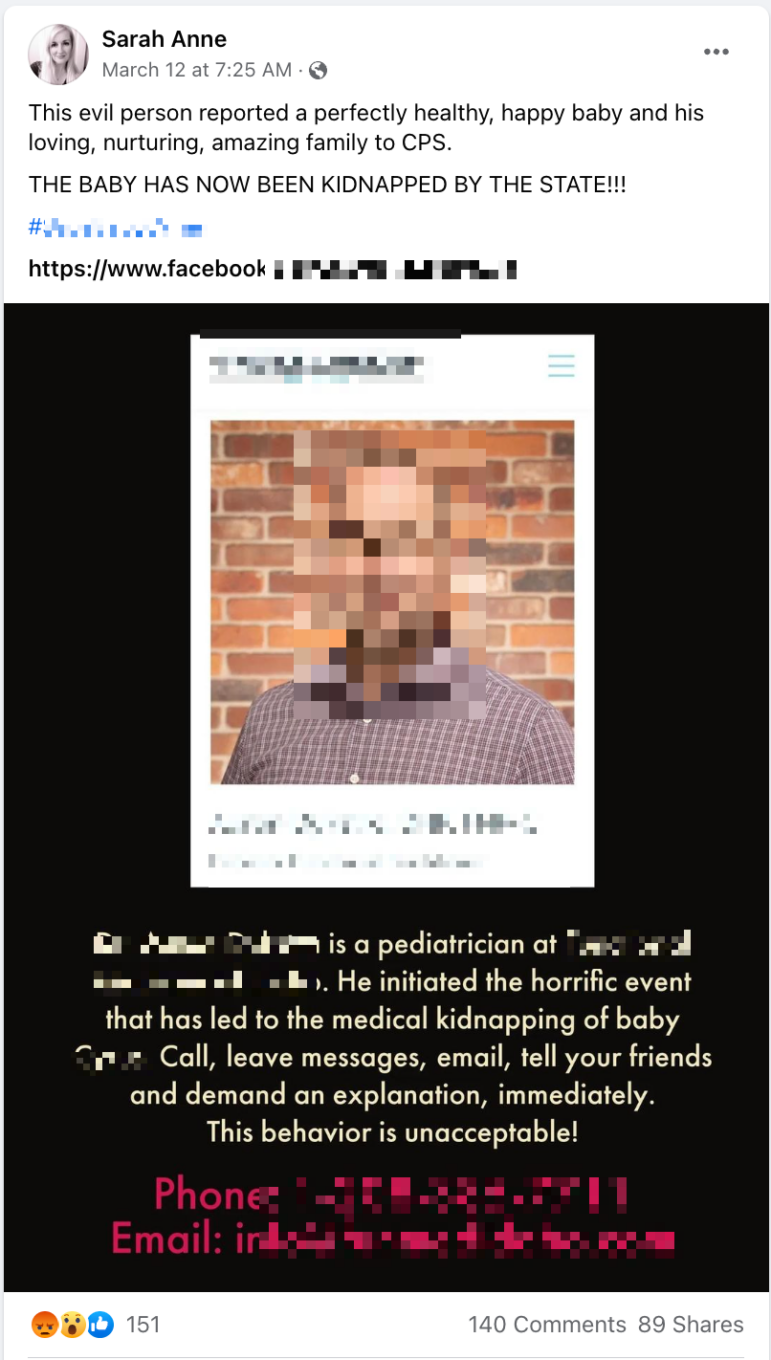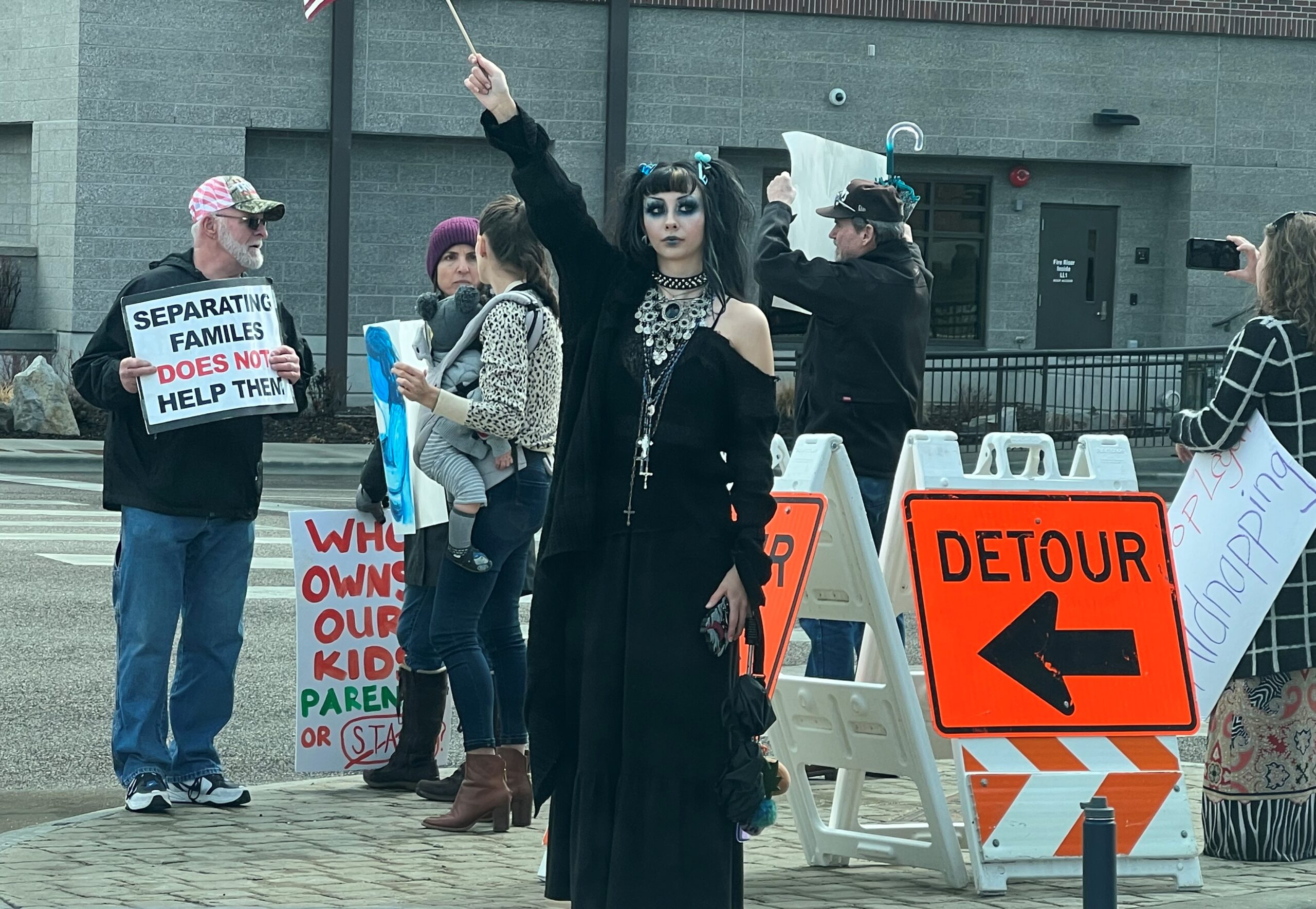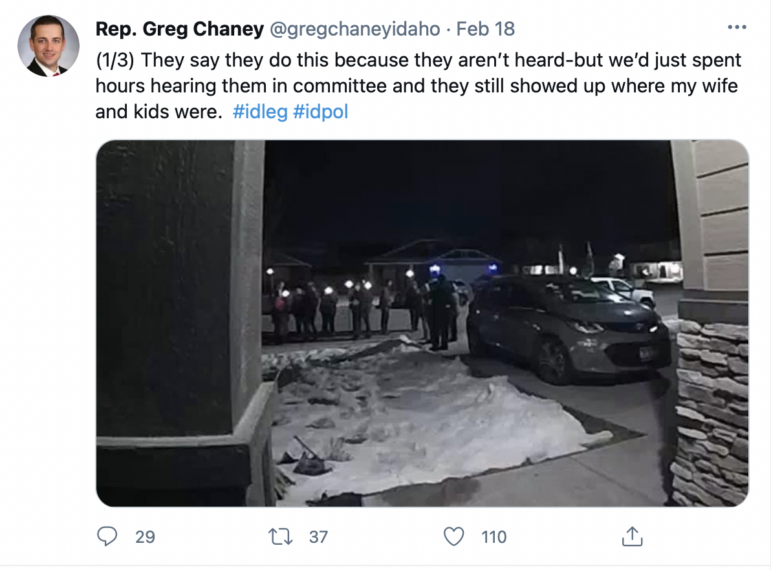by Audrey Dutton / Idaho Capital Sun / April 15, 2022
Boise residents on Saturday found bookmark-sized fliers in their neighborhoods.
A large black box at the top read, “POLITICAL PROSECUTION.”
Below it were photos, home addresses, phone numbers and email addresses of two people: 4th District Magistrate Judge Annie McDevitt and Ada County Deputy Prosecuting Attorney Whitney Welsh.
The flier claimed that McDevitt and Welsh were “using their position of power to retaliate against a gubernatorial candidate because of his opposition to the inequity of justice and systemic excessive force used by government agents” — a reference to Ammon Bundy.
It was the latest in a series of maneuvers by Idaho extremist groups that toe the line between free speech and criminal behavior. Their tactics include:
- “doxxing” public and private individuals, including health care and social workers;
- organizing protests outside a person’s home;
- issuing “calls to action” for supporters — in Idaho and elsewhere — to make phone calls and send emails and text messages, until their demands are met.
Luke Malek, an attorney who previously served in the Idaho Legislature, says the tactics could cross a line into stalking or even criminal conspiracy. Two current legislators — Reps. Greg Chaney, R-Caldwell, and Brooke Green, D-Boise — say that, regardless of whether a crime has been committed, one person’s right to protest should not trump another’s right to feel safe in their home.
“It’s become an extremist tactic very frequently, and it started really over the summer of 2020, for these extremists to get their way by being more intimidating than everyone else,” said Chaney, who co-sponsored a bill in the 2021 session to outlaw protesting at a person’s residence — only to then have protesters show up at his own home. “They’re all about shutting up anybody who doesn’t agree with them.”
Chaney and Green plan to bring back a bill in the 2023 legislative session to address the issue.
The latest Idaho doxxing campaign
Ammon Bundy did not complete 40 hours of community service — his sentence for a conviction of trespassing and resisting arrest, stemming from Bundy’s refusal to leave a closed area at the Idaho Statehouse in 2020.
Instead of performing community service, though, Bundy reported 40 hours of time spent on his political campaign for Idaho governor.

Sarah Clendenon, a leader of Health Freedom Idaho and Constitution Party candidate for state office, posted on Facebook an unedited version of this graphic. It included the identity, photo, workplace and contact information of a pediatric health care provider involved in a child protection case. (Edited by Audrey Dutton, Idaho Capital Sun)
McDevitt on April 7 ordered Bundy to spend 10 days in jail and pay a $3,000 fine for disobeying the court.
“You didn’t just blow it off. Rather, you took the time and effort to blatantly disrespect the court’s order, making a mockery of the sentence you received,” McDevitt told Bundy, according to the Idaho Statesman. “You were given an opportunity to go complete public service — you could have done it.”
The flier left in the Boise neighborhood did not acknowledge the legal basis for Bundy’s new jail sentence.
“He is now being held, a political prisoner, in solitary confinement, at the Ada County Jail, causing a hardship on his family,” the flier said. “TELL THESE JUDICIAL EXTREMISTS TO STOP TORMENTING THE GOOD PEOPLE OF IDAHO!”
Bundy was indeed in solitary confinement at the jail as of Saturday — because Bundy himself asked to be placed there — according to Ada County Sheriff’s Office spokesperson Patrick Orr.
“Our agency considered that request and figured there could be possible security issues, so for his safety and the safety of the other inmates, we granted his request,” Orr said in a statement to the Idaho Capital Sun.
Exercising freedom of speech, or victimizing another person
The U.S. Congress and state legislatures have, for years, considered whether it should be illegal to “doxx” someone — to find and share an individual’s personal information in a way that makes the person vulnerable to harassment, death threats, false reports to police and more.
Last year, Colorado made it illegal to doxx public health workers and their families.
The First Amendment guarantees the right to freedom of speech, freedom of the press and other inalienable rights that protect a person’s ability to share information. There are limits to those rights — codified by laws against libel, slander, defamation, harassment, witness intimidation, stalking and more.
Free speech advocates have argued that laws against doxxing could be abused to silence dissent.
“Any of these laws could be subverted by the powerful,” Bruce Schneier, a fellow at the Berkman Klein Center for Internet & Society at Harvard University, told The Markup last year.
The pandemic and 2020 election breathed new life into the doxxing tactic.
It has been used in Idaho in the past year to identify and share photos, home addresses and personal contact information of judges and legislators, as well as unelected workers: police officers, a social worker, a pediatrician, a nurse practitioner and a deputy prosecutor.
There is no law in Idaho that specifically makes doxxing illegal. Depending on the case, it may violate state laws against stalking or conspiracy, Malek said. Or, it might not.
The world is full of “things that are objectionable to our senses that aren’t a crime,” Malek said.
Idaho’s statute for stalking in the second degree makes it illegal to “knowingly and maliciously” make “repeated acts of nonconsensual contact” in a way that “seriously alarms, annoys or harasses the victim” and “would cause a reasonable person substantial emotional distress (or) fear of death or physical injury” to themselves or to a member of their family or household.
The penalty is up to one year in jail, a $1,000 fine or both.
The statute, however, exempts constitutionally protected activity.
“The pattern of behavior is one thing, and it’s just grating on people with a sense of what is common decency,” Malek said. “In order to charge a crime, you have to look at: Did this instance of behavior violate the law?”
It can be hard to prove that a single instance was indeed a criminal act, he said.
And whom do you charge? The flier distributed last weekend, for example, did not appear to identify its creator.
Asked if doxxing could be charged under a stalking statute, Malek said, “I think you would have an argument there.”
When doxxing leaves the internet and enters ‘real life’
The tactic was used by Bundy supporters and other extremists last month, in a campaign to end-run Idaho’s child protection process.
A grandchild of Bundy associate Diego Rodriguez had been removed from his home and hospitalized. A pediatric provider had alerted authorities that he believed the child was in danger, and the parents were not showing up for medical follow-up appointments.
Rodriguez, Bundy and leaders of Health Freedom Idaho issued “calls to action” that jammed up telephone lines at St. Luke’s Boise Medical Center, blocked ambulance bays and posed a threat that forced the hospital into lockdown. Patients had to be diverted to other hospitals for emergency care.
A few days before that, Health Freedom Idaho leader Miste Gardner-Karlfeldt — who is running for Idaho State Controller as a Constitution Party candidate — posted on her Facebook page:
- Please call St. Luke’s Hospital in Boise at (208) 706-5437 and demand that they let (the baby’s) parents take custody of (him) or at least be present with him.
- Please post this link along with the attached image to your social media and contact everyone you know to share this story. …
- Please show up to St. Luke’s Hospital in Boise at 190 E Bannock St, Boise, ID 83712 TODAY, Saturday March 12th, @ 12:00 noon to protest with us and pressure St. Luke’s to reconnect the Anderson family.
Following the protests at St. Luke’s, an anonymous Twitter account posted the addresses, phone numbers, dates of birth and Facebook pages of Gardner-Karlfeldt, Sarah Clendenon, another leader of Health Freedom Idaho and the Constitution Party candidate for a state senate seat in District 15, among others.
In a Facebook Live video posted March 18, Clendenon and Gardner-Karlfeldt blasted those who had doxxed them, calling it “absolutely absurd and atrocious.”
“…[it’s] really a petty way to try to incite fear into people,” said Gardner-Karlfeldt. “I mean, whoever did that is probably living in their mother’s basement.”
Later that day, the two women recorded themselves in the neighborhood of Sen. Fred Martin, a Boise Republican and Clendenon’s political opponent. They said they were distributing fliers with Martin’s home address and phone number, which are publicly available on the state Legislature’s website.
Just four days prior, both women shared on Facebook a flier with the name and picture of a nurse practitioner they claim initiated the removal of Rodriguez’s grandchild from his parents. It also included the phone number and email address of the clinic where the nurse practitioner works.
Similar to the St. Luke’s campaign, the flier urged people to “Call, leave messages, email, tell your friends and demand an explanation immediately! This behavior is unacceptable!”
“These protests are working; people are being held accountable. The evil in our government are really squirming,” Clendenon said in the Facebook Live video. “They are feeling very uncomfortable right now because a lot of things are getting blasted out there.”
Pettinger says doxxing is reaction to ‘their lust for power’
Protests during the pandemic, over everything from public health orders to employer vaccine mandates, have at times drawn crowds numbering in the hundreds. But demonstrations or campaigns targeting individuals, elected or otherwise, attract a much smaller group of determined individuals.
One of the most prominent and visible far-right agitators is a man named David Pettinger – a close ally of Clendenon and Gardner-Karlfeldt.
Pettinger’s Facebook feed ranges from homophobic insults tossed at mainstream Republican lawmakers to calling for those working for three local media outlets to be executed, likening them to Nazi propagandists.
He’s also shared photos documenting his run-ins with law enforcement at the Idaho Capitol – once dressed in an orange suit, dyed green hair and face paint resembling the Joker from the Batman series.
Another time, he stuck a large, yellow star to the lapel of a suit jacket – resembling a badge used by Nazis to identify Jews.
Pettinger was one of three people arrested in connection with a protest in December 2020 at the home of former Ada County Commissioner Diana Lachiondo. A video that’s since been deleted showed them banging on buckets, blasting air horns and playing clips from the movie Scarface.
He eventually pleaded guilty to vandalizing property. Pettinger also pleaded guilty to obstructing officers in an encounter just days before the protest at Lachiondo’s home.
But those cases could be dismissed and never appear on Pettinger’s criminal record if he successfully completes his one-year probation sentence through August 2022.
“Free speech is absolute,” he said in a conversation with Boise State Public Radio over Twitter direct messages, noting that he didn’t create the fliers.
Releasing personal information in these circumstances, Pettinger said, is a tactic to add pressure against “their lust for power over The People” and to hold them accountable for their actions.
(3/3) They say this isn’t an intimidation tactic but they showed up with torches and pitchforks and a stuffed animal hung in effigy. One of our little girls asked @sarahchaney248 this morning “why do they want to kill dad?” (p.s. that’s my kids’ surname, too). #idleg #idpol pic.twitter.com/gSCOoCFyH8
— Rep. Greg Chaney (@gregchaneyidaho) February 18, 2021
Green and Chaney to reintroduce bill
The protest at Lachiondo’s home was one of the events that spurred a bipartisan effort between Reps. Chaney and Green.
Together, they introduced House Bill 195 in 2021 to address one piece of the doxxing tactic: protests at a person’s home that seek to intimidate, annoy or alarm the target.
After Chaney held a hearing on his anti-picketing bill last year, a small group of people stood outside his home with literal torches and pitchforks, and a stuffed dog wearing a T-shirt that said “Chaney.” The dog was hanged in effigy.
Chaney tweeted that one of his daughter’s asked, “Why do they want to kill dad?”
The bill died.
Protest leaders “told people if (the bill) dies, we’ll quit using this tactic,” Chaney told the Idaho Capital Sun. “Well, HB 195 died, and within two weeks they were protesting the magistrate from Bundy’s previous trial. So, they lied. They’re determined to use this tactic — to get their way, not because they have the strongest argument or (because they) represent the best in our society.”
Chaney and Green are now frequent targets of Pettinger.
Pettinger has posted multiple pictures of the hanged stuffed animal wearing the “Chaney” T-shirt.
Green said the protests and doxxing may have begun with elected officials, but they now target people who “didn’t sign up for this” as social workers, health care workers and law enforcement officers.
“They’re showing up in front of private citizens’ houses to torment them for just doing their job,” Green said. “(The individuals are) not law enforcement trained, they didn’t put their name on a ballot … and their poor children are inside witnessing this.”
Green worries that “it’s going to escalate one day, where we have this notion that we are going to protect our kingdom, that’s our sanctuary … the castle doctrine,” she said. “We’re going to see a conflict that is going to escalate.”
She argues that it’s also harmful to society at large.
A child protection worker should not have to worry that their professional work could invite retaliation, with their photo and home address shared on social media, Green said.
During the child protection case involving Diego Rodriguez’s grandchild, Pettinger posted a digital flier on his Facebook page, in a design similar to the one distributed Saturday.
The flier doxxed a nurse practitioner, social worker and law enforcement officers involved in the case. It identified each one as “PERPETRATOR.”
“Repentance is for God! Slaying is for me!” Pettinger wrote in a comment on that Facebook post.
When asked what he meant by that comment, he said he believed “armed conflict was imminent.”
“The state of Idaho had crossed the boundaries of the Idaho Constitution, and I was prepared to defend innocent life,” Pettinger said.
Another comment on the post included the name and photo of a pediatrician at St. Luke’s Health System. “She initiated this and has a history of working in conjunction with the judge to remove kids from homes,” the other commenter wrote. “Pure evil!”
FEATURED IMAGE: St. Luke’s downtown Boise hospital was on lockdown and diverted patients to other health facilities for about an hour, after Ammon Bundy and others encouraged their followers to show up at the facility to protest a child protection services case. (Idaho Capital Sun)
Idaho Capital Sun is part of States Newsroom, a network of news bureaus supported by grants and a coalition of donors as a 501c(3) public charity. Idaho Capital Sun maintains editorial independence. Contact Editor Christina Lords for questions: info@idahocapitalsun.com. Follow Idaho Capital Sun on Facebook and Twitter.




